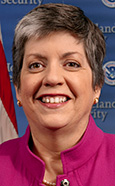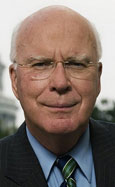Napolitano equates farm workers with DREAMers
April 19, 2013 | 06:05 PM

Homeland Security Secretary Janet Napolitano today tied a path for legalization and citizenship for farm workers to that for the DREAMers, the young people who have been brought to the United States illegally as children and are now in college.
Napolitano did not testify as scheduled at a Senate Judiciary Committee hearing today on the immigration reform package put forward by the “gang of eight” senators because she was busy with the search for the suspects in the Boston bombing case, but her written testimony was distributed to reporters.
The Obama administration believes, Napolitano said, that “childhood arrivals — known as DREAMers — should be eligible for earned citizenship. Additionally, immigrant farm workers, many of whom are currently undocumented, must be provided a similar opportunity to get on the right side of the law.”
Republicans have blocked the DREAM Act that would give legal status to the young immigrants, but the White House, using its administrative powers, has decided not to pursue the deportation of these students.
Napolitano noted, however, that the administration believes that immigrants who are in the country without documents must register, submit biometric data, pass criminal background and national security checks and pay fees in order to be eligible for provisional legal status.
In the testimony, Napolitano praised the efforts of the “gang of eight,” but also noted that President Barack Obama has called the bill a compromise, and that there are some provisions with which the administration does not agree.

Senate Judiciary Committee Chairman Patrick Leahy, D-Vt., said that Napolitano would testify at a later date, and that the committee would mark up the bill in May. Senate Majority Leader Harry Reid, D-Nev., has also said he hopes to bring the bill to the Senate floor in June.
Leahy and Sen. Dianne Feinstein, D-Calif., stressed the importance of the farmworker provisions in the immigration reform proposal.
Agriculture workers are “essential” to providing the nation’s food supply, and the bill would allow the dairies that are important to Vermont to import workers, Leahy said.

Feinstein noted that “agriculture in this nation is a huge industry. It is in the main served by undocumented immigrants, people who become very skilled at the work they do.”
“A lot of agriculture has gone outside the country,” she said, because farmers could not find workers and other farmers have had to curtail their activities.
After thanking Sens. Marco Rubio, R-Fla., Orrin Hatch, R-Utah, and Michael Bennet, D-Colo., for working many hours on the agriculture section, Feinstein noted that they had negotiated “with a multiplicity of farm organizations.”
The farmers, Feinstein said, wanted wage specificity and the union wanted decent wages and worker protections. Out of these negotiations, she said, came the proposal for blue cards for workers who are already in the United States and promise to stay in agriculture and the elimination of the H2A visa program and creation of two new visa programs, one for at-will workers and the other for contract workers.
Noting that the Agriculture Department would run the new program and that both the farm groups and the United Farm Workers have endorsed it, Feinstein said, “I believe it is a good solution” that will supply farmers with workers. But she also added, without explanation, that “there are a couple of edits we need to make in the bill.”
The hearing also brought out arguments for and against the bill and gave an indication of where opposition would arise.
Sen. Charles Grassley, R-Iowa, said the legislative process is “off to a rough start” because the Democratic majority is rushing the legislation, and that in the wake of the bombings in Boston — which today were connected to ethnic Chechen immigrants — it would be important to examine whether there are any “deficiencies” in the immigration system.
But Sen. Charles Schumer, D-N.Y., said that it is important “not to conflate this legislation with what is going on in Boston,” and that the United States has improved screening procedures in the last five years.
Sen. Lindsay Graham, R-S.C., said that most workers at meat plants and peach plants are Hispanic and that the bill is needed to ensure a supply of workers who will also pay taxes for future Social Security and Medicare payments.
But Sen. Jeff Session, R-Ala., said the bill “was written by big business, big agriculture and not in the public interest.”
Hatch said he wants “to support this bill if I can,” but his fellow Republican Utahan, Sen. Mike Lee, said he is wary of writing immigration legislation “in one fell swoop.”

Peter Kirsanow, a member of the U.S. Commission on Civil Rights, testified that the presence of low-skilled immigrants lowers wages for low-skilled work, and is partly responsible for the high unemployment rate among black men.
Under questioning, he acknowledged that making the immigrants legal will reduce this wage pressure “at the margins.”
Kirsanow said it is not is practical to consider deporting the 11 million undocumented immigrants now living in the country, but that he believes actions other than providing them legalization could be taken, such as making it more difficult for “rogue employers” to hire undocumented workers. Low-skill workers should not be “thrown under the bus,” and they are being given no role in this discussion, Kirsanow said.

Douglas Holtz-Eakin, a former director of the Congressional Budget Office, said that immigration reform would lead to economic growth. The problem of employment of low-skilled workers is not an immigration issue, he said, but one of competition in a globalized economy, in which there is a surplus of low-skill labor.
At the urging of Sen. Jeff Flake, R-Ariz., Holtz-Eakin described a Heritage Foundation report that said legalizing undocumented workers would cost the government money as a study with a flawed design.
Sen. Amy Klobuchar, D-Minn., noted that she chairs the Senate tourism caucus and that the bill covers tourist visas as well as worker visas, and that making it easier for foreign tourists will help the American economy.
Sen. Al Franken, D-Minn., noted that two Minnesota companies — Carlson, the travel company, and Medtronic, a medical device maker — have joined a coalition of 30 companies backing equal treatment for the spouses and partners of gay and lesbian immigrants on the grounds that the lack of fair treatment for gay and lesbian families has made it difficult for them to recruit some workers.
Franken asked Holtz-Eakin, president of the American Action Forum, to comment on the economic impact of this provision.
The companies’ ability to recruit the employees they want “should increase productivity,” said Holtz-Eakin, a former Republican government appointee. But he added that he had not examined the specific provision.